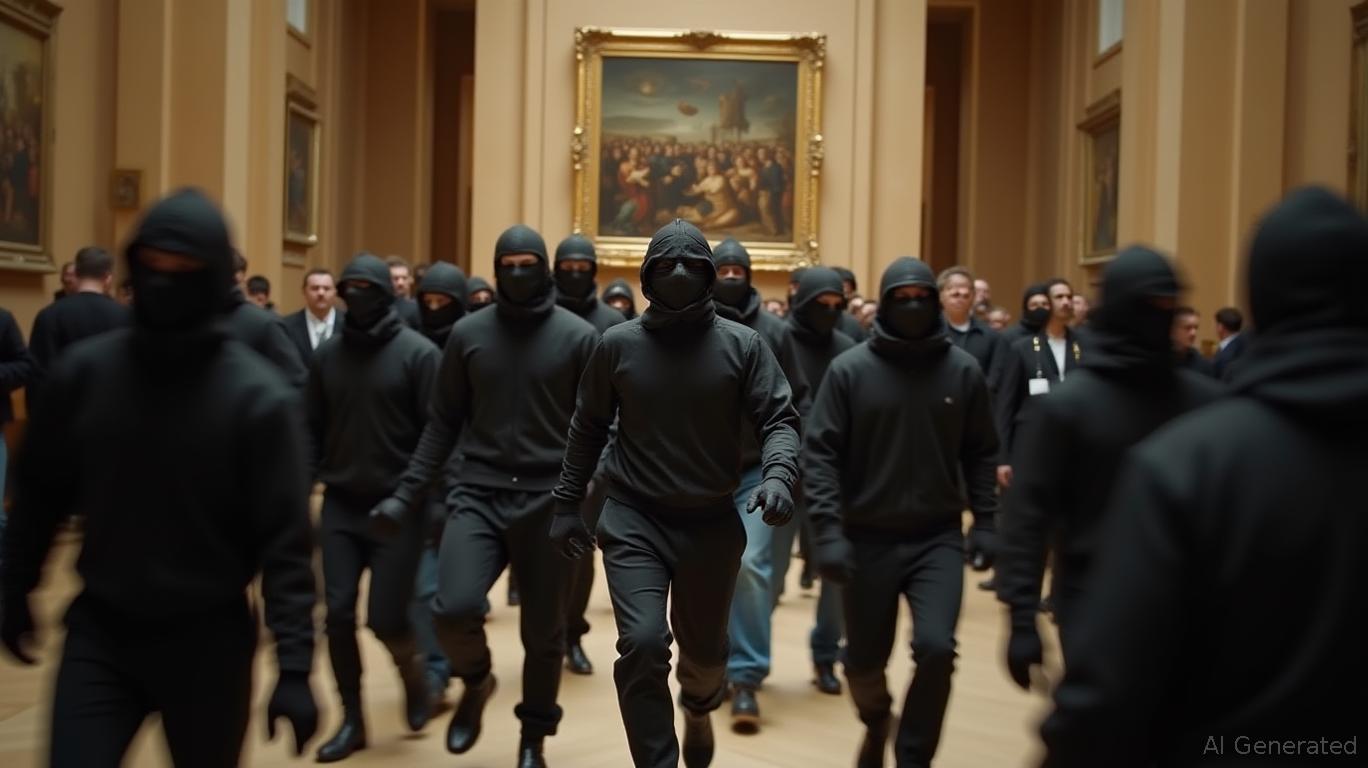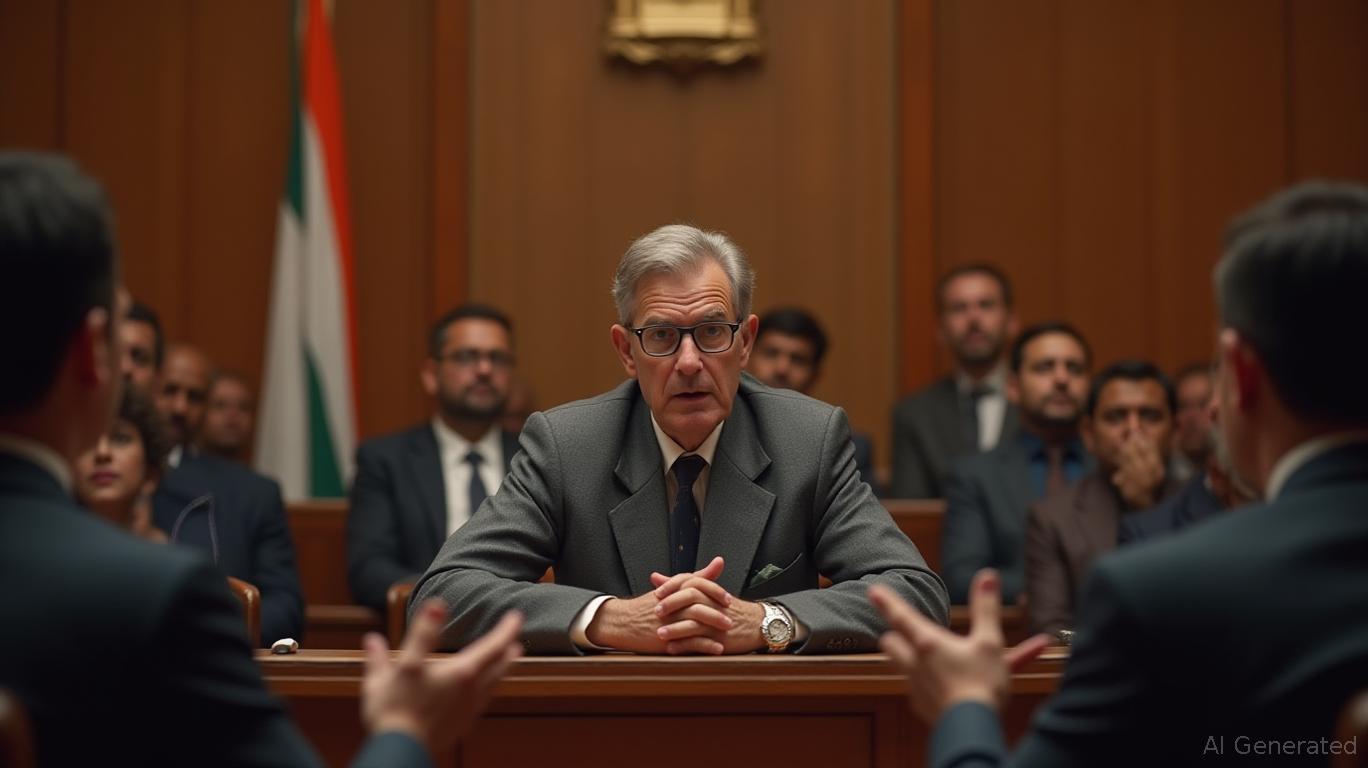Louvre Theft Highlights Security Failures and Financial Challenges in France
- French police arrested two suspects in the $102M Louvre heist, where thieves used a crane to steal jewels in 4 minutes. - Louvre director Laurence des Cars resigned (rejected) after admitting outdated security systems with critical blind spots in the Apollo Gallery. - A 2025 audit revealed only 40% of key wings had camera coverage, exposing chronic underinvestment in infrastructure and security upgrades. - Experts warn stolen 19th-century jewels will likely be dismantled and sold on black markets, with n
The theft at the Louvre Museum, involving $102 million worth of French crown jewels, has ignited a nationwide debate about security shortcomings at the globe’s most popular museum. After a week of searching, French police apprehended two individuals on October 25, with one suspect caught trying to escape to Algeria from Paris-Charles de Gaulle Airport, according to
On October 22, Louvre Director Laurence des Cars told the French Senate that the museum’s security measures were “obsolete” and failed to stop the break-in. She pointed out missing external camera coverage, including a significant blind spot on the balcony used by the thieves, and accepted personal accountability for the breach, according to

This robbery highlighted deep-rooted security flaws. An audit by France’s Cour des Comptes in 2025 found that surveillance cameras covered only 40% of the Sully Wing and 25% of the Richelieu Wing, as
Officials in France have described the event as a “national disgrace.” Justice Minister Gérald Darmanin condemned the museum’s “extreme vulnerability,” while Interior Minister Laurent Nunez commended law enforcement for their quick arrests, Mezha reported. The stolen treasures, such as a sapphire tiara once owned by Empress Eugénie and an emerald necklace from Marie-Louise, are considered unlikely to be found in their original form. Specialists caution that the jewels may be broken up and sold illegally.
Authorities have also refuted rumors that the Louvre contacted an Israeli intelligence agency, with museum officials denying any such outreach, according to
After being closed for three days, the Louvre reopened on October 22 and remains at the center of discussions about how to balance protecting heritage with modern security needs. As President Macron stressed in a cabinet session, “The drive to renovate the museum must continue,” as quoted by a CM Asiae report.
Disclaimer: The content of this article solely reflects the author's opinion and does not represent the platform in any capacity. This article is not intended to serve as a reference for making investment decisions.
You may also like
India's judiciary declares cryptocurrency as lawful property in a historic decision
- India's Madras High Court ruled cryptocurrency as legal property, blocking WazirX from redistributing a user's frozen XRP during its post-hack restructuring. - The court emphasized crypto's "intangible property" status, requiring a ₹9.56 lakh bank guarantee to protect the investor's holdings until arbitration concludes. - The decision challenges offshore restructuring plans, affirming Indian jurisdiction for domestic investments and aligning with global precedents like New Zealand's Cryptopia ruling. - I

Ethereum Update: Despite $169M Loss, Staking Boom and Dencun Enhancements Fuel Optimism for $8K
- Ethereum lost $169M in exchange outflows but leveraged ETPs show strong demand, signaling bullish sentiment. - Bitcoin attracted $921M inflows amid Fed rate cut optimism, highlighting crypto market rotation toward safe-haven assets. - Institutional staking demand and Dencun upgrades reinforce Ethereum's long-term appeal, with $8K 2025 price forecasts. - Macroeconomic uncertainty and Fed policy focus drive risk-on rallies, while ETF approvals could unlock new capital inflows.

Whale deposits $3.72M USDC into Hyperliquid, opens $27.7M BTC long

Spot XRP, Solana, and Litecoin ETFs may launch in next two weeks, expert speculates
